The details of this article were written by Fabris Mulindi, the founder of SOLFA Uganda
For as long as I can remember, my biggest dream has been to graduate. In my community, stepping onto a graduation stage is more than just an academic achievement—it is a symbol of survival, proof that one has defied the odds. I envisioned myself standing proudly, surrounded by familiar faces, capturing my accomplishments in photographs, and celebrating with those who believed in me. However, for 19 years, this milestone eluded me. It was not until June 2024 that I finally graduated from high school at African Leadership Academy with the Sani Prize, a moment that marked the culmination of years of struggle and resilience. SOLFA can be found on LinkedIn here.
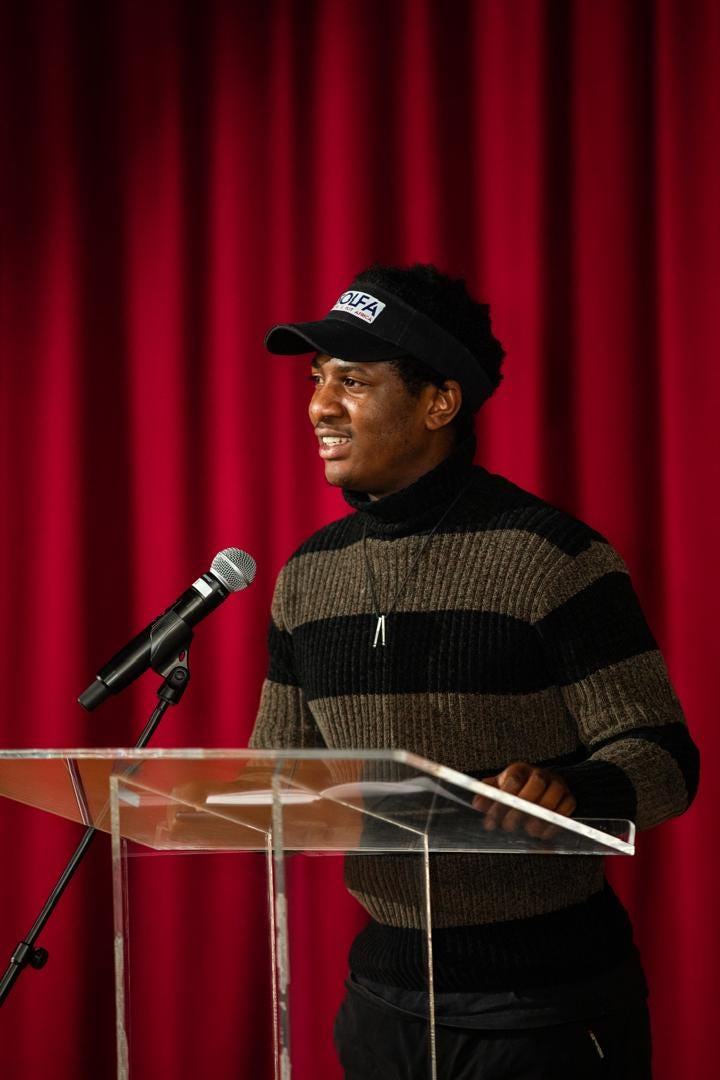
Where was the founder of SOLFA Uganda born?
I was born in the Democratic Republic of Congo, but my family and I were forced to flee due to war, seeking refuge in Uganda’s Kyangwali Refugee Settlement. The move shattered our lives. We arrived with nothing, thrown into an unforgiving world where survival was a daily battle. The concept of “home” became transient; every day in the settlement reminded us that we were displaced, powerless and forgotten. We lived in makeshift structures for a while, relying on humanitarian aid that was never enough.
It was not long before I started schooling at Kasonga Primary in the camp. Attending school in Kyangwali was a privilege only a few could afford, even though education was our only hope for escaping the cycle of poverty. At Kasonga Primary School, the reality of the gap in education was stark—my first classroom was packed with over 300 students, some standing, others, including me, seated on the bare dusty floor. There were no reading books, textbooks or libraries at the time, and the teachers were overwhelmed by the number of pupils they had to take care of. My visual impairment, a condition I had since birth, made learning even harder. I struggled to see the blackboard, and there were no resources to accommodate students like me. Instead of support, I faced relentless bullying from peers and sometimes teachers. I was labeled the “half-blind kid,” mocked for my inability to see clearly or follow along in class. The taunts became unbearable. In my primary four, I had to drop out of school, defeated by a system that seemed designed to exclude me.
For two years, I remained out of school, working in gardens, doing household chores and taking care of my younger siblings. I watched the education system determine who deserved respect and who did not in society. A pivotal moment came when a peer from a wealthier background visited our village. He read aloud in English, effortlessly navigating words that I could barely understand. Everyone around me respected him for his ability to speak and read English, while I was criticized for dropping out of school to care for my younger siblings and assist my parents with farming and household chores. That moment crushed me. I saw, with painful clarity, how society viewed those who lacked formal education: as failures, destined for a life of poverty. It was then that I resolved to fight for my future. I returned to school, determined to reclaim my dignity and rewrite my story.
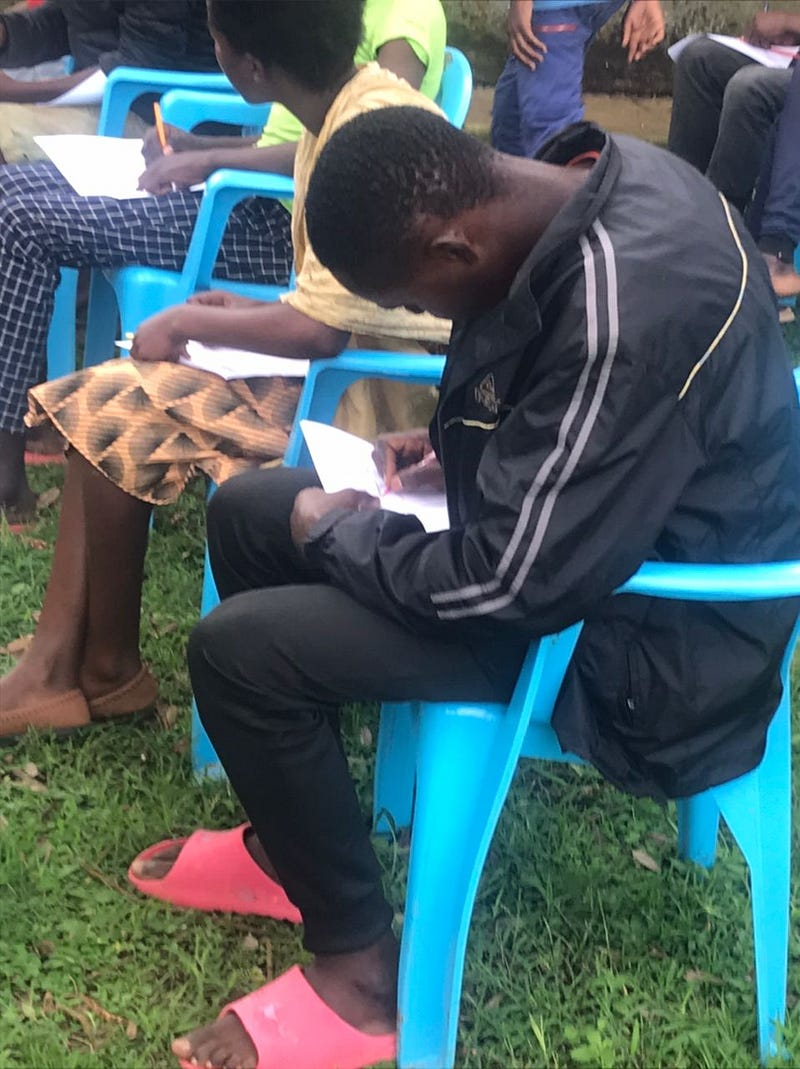
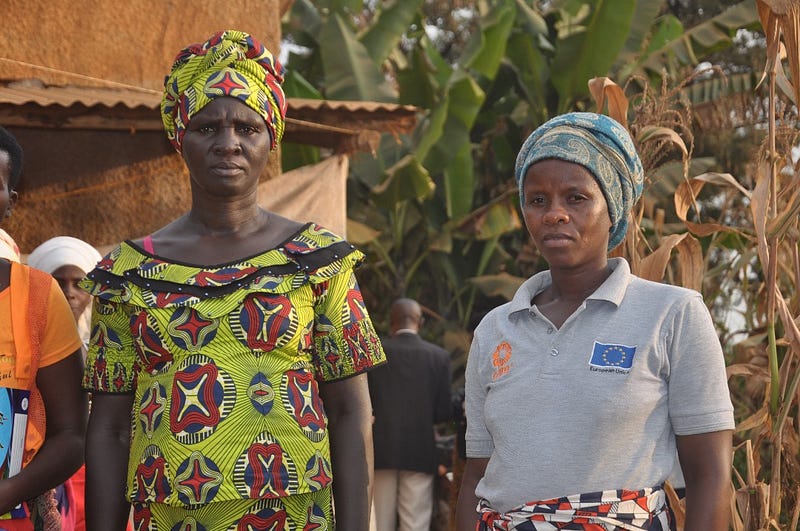
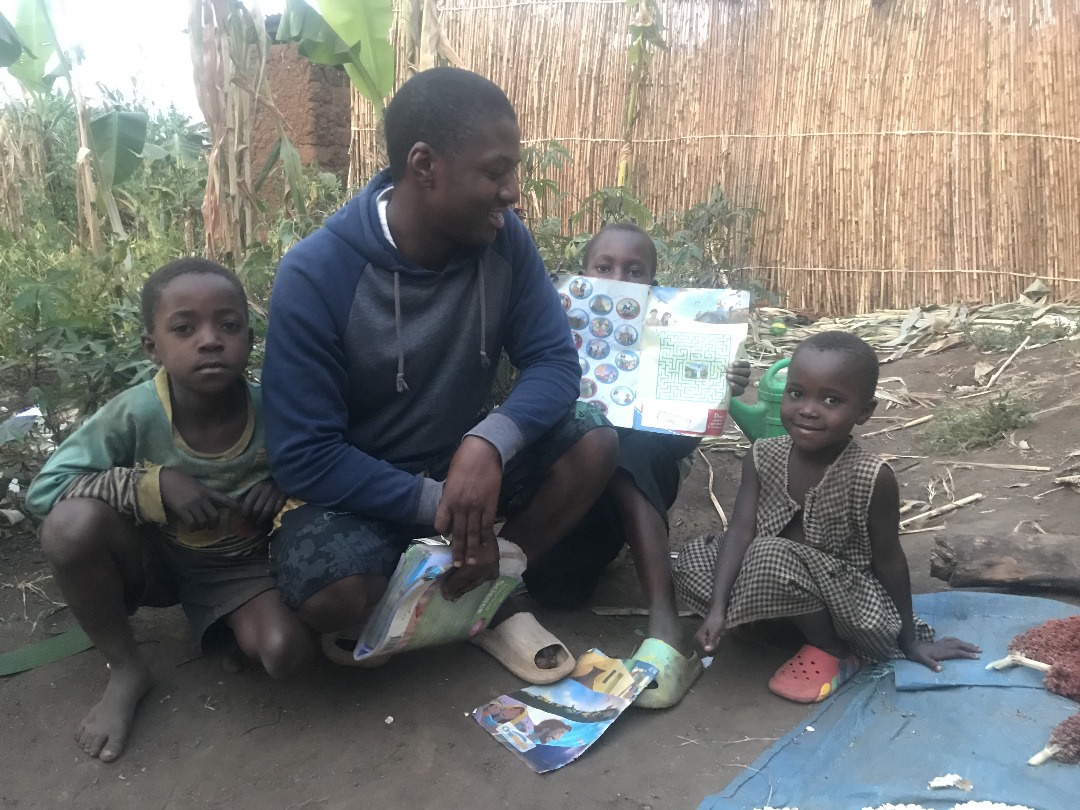
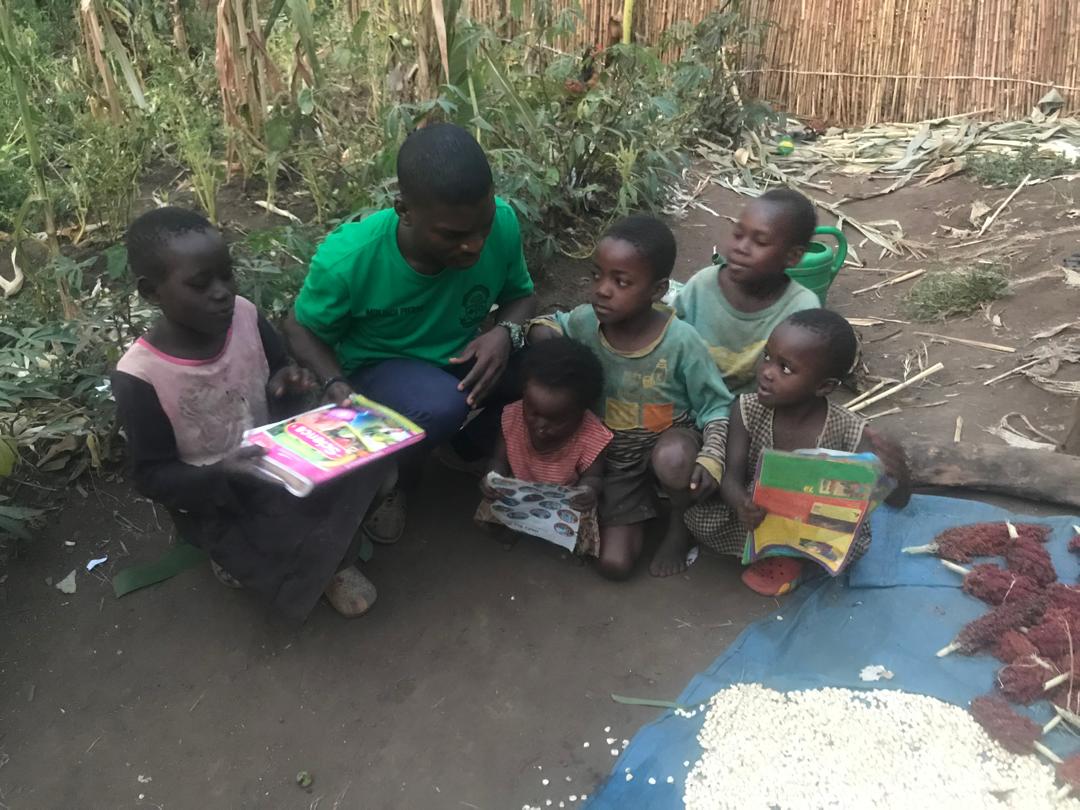
Influence of Agricultural and Climatic Changes according to the SOLFA Uganda founder
The struggles my community and I faced were not isolated incidents; they were rooted in larger systemic failures. In Kyangwali, over 99% of the population, including my own family, relied on subsistence farming. But the land, once fertile, was rapidly becoming barren. Climate change made rainfall unpredictable, soil quality deteriorating, and invasive pests destroying harvests. The society clung to the hope that working harder would bring better yields, but no amount of digging could change the fact that the land was dying, climate change was worsening and environmental degradation was increasing.
The consequences were devastating. Families who once lived off their farm produce found themselves unable to put food on the table. Malnutrition rates soared followed by economic breakdown and inaccessibility to basic needs. Children, instead of attending school, were sent to the fields to work. The dropout rate increased exponentially, with thousands of students leaving school each year, not because they lacked ambition, but because education became an unaffordable luxury. Without food security, everything else crumbles. Healthcare deteriorates, crime increases and an overwhelming sense of hopelessness consumes a society.
For my family, these struggles were personal. There were nights we slept hungry, surviving on cassava or sweet potatoes if we were lucky. My younger siblings would wake up in the middle of the night, crying from hunger pains. It was a cruel reality—one that exposed the cracks in our social system. Education was supposed to be a pathway out of poverty, but how could we focus on learning when our stomachs were empty?
The economic collapse of our community mirrored the destruction of our educational institutions. Schools lacked the most basic resources—no books, no clean water, no desks. Teachers, underpaid and overburdened, often abandoned their posts. These realities extend beyond my community—they have existed for generations and continue to persist in countless African communities and beyond. The system was broken, and we were trapped in it.
How was SOLFA started?
I refused to accept that this was the only fate available to us. Pursuing education alone wasn’t and isn’t enough—I had to be part of the solution, I knew that if the system was broken, we had to build a new one.
What is SOLFA Uganda?
This realization led me to start Solve and Flourish Africa (SOLFA) – a social enterprise dedicated to addressing the intersection of agriculture, climate change, education gaps among other social challenges.
SOLFA aims to transform communities, including refugees, by providing innovative solutions to agricultural challenges. We focus on sustainable farming techniques that combat soil degradation, irrigation solutions that mitigate water scarcity, and education programs that equip youth with skills beyond traditional schooling ensuring that children don’t have to choose between education and survival. By integrating sustainable farming, environmental restoration, and social impact, SOLFA is not just about growing food—it’s about rebuilding communities and securing a future where education and prosperity are within reach for all.
Educational Disparities Rooted in Agriculture, Climate Change, and the Role of Marginalized Communities in Africa’s Development
In a world characterized by rapid technological advancements and global interconnectedness, education has emerged as a key driver of social and economic development. Unfortunately, within some communities, such as Kyangwali Refugee Settlement and others across Uganda and beyond, a segment of society remains marginalized and bereft of educational opportunities. This includes dropouts, single parents, refugees, internally displaced people, and those who never had the chance to attend school. My parents, along with an estimated 47% of youth and 90% of adults in my community, based on 2018 data from the United Nations High Commissioner for Refugees (UNHCR), fall into this category. Excluded from formal education, these individuals are also cut off from the broader socioeconomic benefits that come with it.
Africa, a continent rich in culture and natural resources, has long struggled with persistent educational disparities. Despite commendable strides in improving access to education, a significant portion of the population continues to face barriers. According to UNESCO, over one-fifth of children aged 6 to 11 are out of school, along with one-third of youth between 12 and 14. Alarmingly, almost 60% of those between 15 and 17 are not in school. These statistics underscore the severe disadvantages faced by marginalized groups—refugees, displaced persons, and impoverished families—who are trapped in cycles of poverty and limited opportunities. The United Nations notes that Africa’s education and training programs suffer from “low-quality teaching and learning, as well as inequalities and exclusion at all levels,” exacerbating systemic issues. Similarly, Amnesty International reports that in South Africa, “the education system, characterized by crumbling infrastructure, overcrowded classrooms, and poor outcomes, perpetuates inequality, failing the most disadvantaged children.”
However, it is important to recognize how, in certain communities across sub-Saharan Africa, the educational disparities are deeply intertwined with agriculture and climate change. This is because these disparities are not a singular issue; they reflect the broader socioeconomic challenges that many rural and marginalized communities face. These communities are often caught in a cycle where their immediate survival needs, such as food, water, and shelter, overshadow long-term educational goals. The divide between economically stable urban communities and the struggling rural populations who are heavily reliant on agriculture offers a powerful lens through which to understand the complexities of education, agriculture, and climate change in African communities and beyond.
Distinct Communities: Stable vs. Marginalized | SOLFA Uganda
In African communities and beyond, the education system can be divided between urban and rural areas, reflecting the differing ways societies embrace and prioritize it. Urban areas often have more access to educational resources, from well-established schools to better-trained teachers, and can manage to prioritize education for their children. These communities have the economic stability to address issues within their education system without the constant burden of securing their next meal or meeting basic human needs. Their survival is not in a perpetual state of uncertainty, allowing them to focus on improving education rather than merely getting by. They can afford to send their children to school and sometimes they may only need to address curriculum or infrastructural issues to further improve educational outcomes.
Rural communities—my own, which is deeply rooted in rural farming practices—are often far less economically stable. These communities rely heavily on agriculture for sustenance, but their agricultural systems are fraught with issues that stem from climate change and environmental degradation. In such communities, the priority is not education but survival. The dire economic conditions, where a large portion of the population lives below the poverty line, make it practically impossible to prioritize education over immediate economic needs, such as acquiring food, clean water, or healthcare. For these communities, access to education is not merely a matter of structural improvement but hinges on overcoming deep-rooted socioeconomic challenges.
Agriculture as the Root Cause | SOLFA Uganda
The Brookings Institution highlights that the disparity between rural and urban education in Sub-Saharan Africa is largely driven by these socioeconomic challenges, particularly in communities where agriculture is the main source of livelihood. Agriculture, which employs more than 60% of Africa’s workforce, has long been neglected, and smallholder farmers, subsistence growers, and informal laborers are the most vulnerable. These communities face the brunt of climate change’s impact: soil depletion, erratic weather patterns, and declining agricultural yields. This creates a paradox where agriculture—often the backbone of the economy—is simultaneously the sector most affected by and least supported in terms of innovation and policy.
The economic instability of rural communities, rooted in deep-seated socioeconomic challenges and worsened by inefficient agricultural systems largely impacted by climate change, disrupts every aspect of life, including education. Since agriculture is the backbone of these communities, its decline due to environmental degradation and climate change directly impacts livelihoods, making survival a more immediate priority than schooling. Addressing climate change—particularly through climate-smart agriculture, knowledge-driven interventions, and sustainable farming practices—is essential to breaking this cycle. Only when these communities achieve economic stability can they meaningfully invest in education and other social reforms, as no child can focus on learning while battling hunger, nor can families prioritize schooling without a stable source of income.
Rethinking Education for Vulnerable Communities | SOLFA Uganda
Traditional education systems are fundamentally disconnected from the realities of vulnerable communities, where many adults lack formal schooling yet bear the responsibility of sustaining their families. These individuals, often trapped in economic hardship, are expected to prioritize their children’s education despite having little exposure to its benefits. With over 60% of the population—mostly adults—left out of formal education, their role as decision-makers in their children’s schooling is overlooked. Without targeted awareness campaigns or accessible learning opportunities, the education gap continues to widen, reinforcing cycles of poverty across generations.
Education is a long-term commitment, often taking decades before yielding economic returns. However, in communities where survival is the priority, such an investment seems impractical. Many young people drop out of school to support their families through farming or household labor, as education offers no immediate relief from financial struggles. Additionally, limited job opportunities, influenced by socioeconomic background rather than merit alone, further discourage families from prioritizing formal education. In this context, schooling appears more like a distant privilege than a viable path out of poverty.
To bridge this gap, education systems must adopt a more practical and immediate approach—one that equips both adults and youth with skills that directly address economic challenges. Community-based agricultural training, climate-resilient farming, and vocational programs can provide immediate financial relief while fostering long-term stability. Once livelihoods improve, families will be more willing and able to invest in formal education. By integrating practical skills with traditional learning, education can become a tool not just for future success but for immediate empowerment, ensuring that vulnerable communities break free from poverty while building a sustainable future.
The Role of Marginalized Communities in Africa’s Development according to SOLFA Uganda
Despite these challenges, marginalized communities hold immense potential to drive Africa’s economic and environmental transformation. Agriculture, though deeply affected by climate change, remains the key to sustaining life in these communities. If these communities are equipped with the knowledge and tools to implement sustainable farming practices, they can not only address immediate food insecurity but also contribute to broader environmental sustainability.
However, we cannot achieve this by solely investing in traditional education systems that take decades to produce results. Instead, we must prioritize immediate interventions that address pressing economic challenges while laying the foundation for sustainable development. The Solve & Flourish Africa (SOLFA) initiative is a prime example of how investing in practical training and innovative agricultural solutions can empower these communities. By focusing on climate-smart agriculture, agroforestry, and sustainable resource management, SOLFA helps rural farmers build resilience against climate change while promoting environmental stewardship. Through training tailored to the specific needs of marginalized communities—such as farming techniques, entrepreneurship, and climate resilience—these communities can break the cycle of poverty and improve their livelihoods.
Ultimately, the development of Africa hinges on its ability to address the educational disparities that exist between economically stable urban populations and economically struggling rural ones. While the urban communities may only need to solve problems within their educational systems, marginalized communities require a more nuanced approach. Their educational challenges are deeply rooted in the broader socioeconomic issues that arise from a poor agricultural system, climate change, and environmental degradation. Addressing these root causes requires a holistic approach that combines training to address knowledge gap, environmental sustainability, and economic empowerment.
By investing in practical, context-specific solutions that address the needs of marginalized communities, we can empower these populations to transform their agricultural systems and, in turn, their lives. These efforts will not only help bridge the education gap but also play a critical role in the broader development of Africa.
The Western world has witnessed individuals who dropped out of traditional education later becoming prominent figures in their communities. Notable examples include Bill Gates, Mark Zuckerberg, and Carl Lindner, some who dropped out as early as age 14. In contrast, Africa has seen fewer instances of such success stories. Standouts in Africa often attribute their success to fortunate circumstances, as the African education path follows a rigid trajectory, leaving little room for those who deviate. This system tends to disregard commitment, skill sets, and talents. The emphasis on an education model that is not universally relevant has resulted in theory-heavy learning that lacks practical application. This discrepancy is evident in the employment of Chinese workers for intricate tasks in Africa, while some Africans, relying on their credentials rather than practical abilities, secure positions. This differs from the situation in Western countries, where skills hold more weight than mere academic qualifications.
When founding SOLFA, I deeply understood the difference between having a skill or talent and having a formal education. One thing I know for certain is that the number of uneducated people on the continent, many of whom have faced systemic injustices and marginalization, is too significant to overlook. Even if we focus solely on nurturing the talents and workforce of the educated population in our cities and across the continent, the large underserved population will still pose a challenge. Their struggles can hinder progress and, worse, pull others—including the educated—into similar cycles of marginalization, ultimately affecting the entire community.
More importantly, I know firsthand what it means to be marginalized and tossed around by life, as if paying for sins you never committed. I have seen the painful contrast of others flourishing and meeting their needs, while you and your entire family work tirelessly every day, yet still struggle to secure even the basics—lunch, dinner, or sometimes even breakfast. I envisioned and devised an innovative strategy to harness the untapped potential of youth, dropouts, refugees, those displaced, single parents, and the unemployed across Africa. I envisioned a communal setting where individuals engage in activities aligned with their passions, talents, skills, and interests, attaining them in the ways they have chosen for themselves. This grants them the autonomy to carve out their unique journey and pursue it through their preferred methods. This approach empowers individuals to seize control of their own lives proactively.
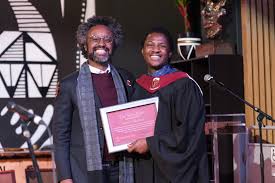
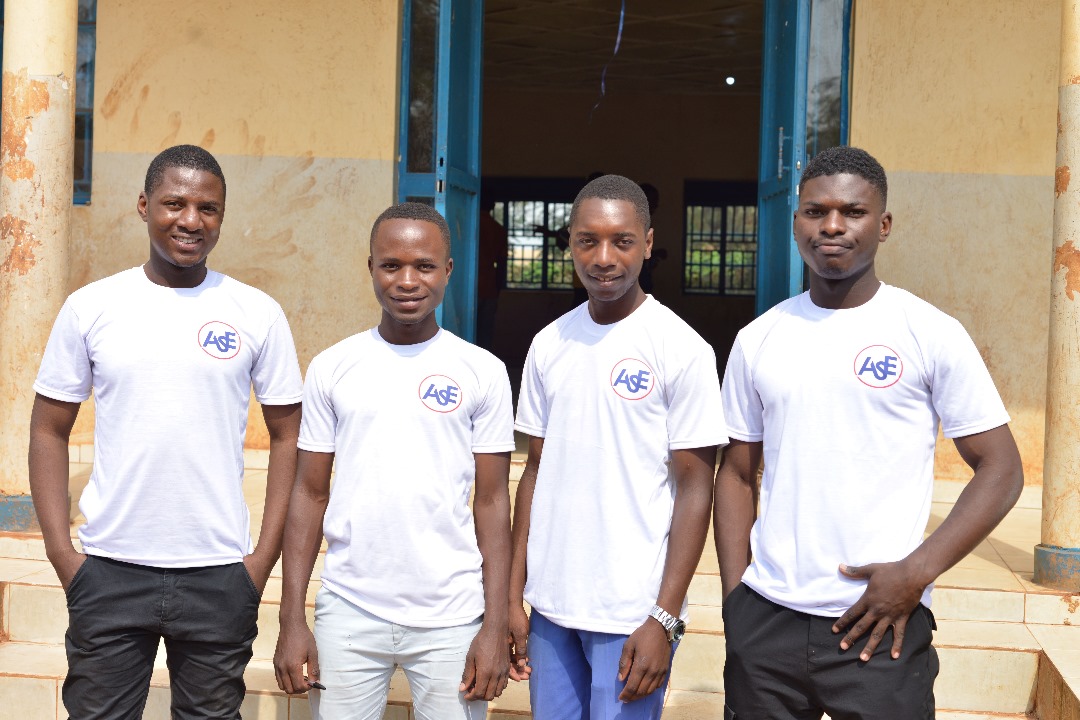
Though SOLFA is a grassroots organization with a noble vision, I envisioned a movement that would take up the mantle to address these disparities head-on. Of course, there is always a first step for everything, and SOLFA is no different. It is born small to take one step at a time to achieve its grand purpose. Led by dedicated individuals who share a passion for education, agricultural innovation, climate change solutions, environmental sustainability, and community empowerment, SOLFA has developed a comprehensive approach that recognizes the unique challenges faced by marginalized groups. The organization hopes to grow and start operating across various regions of Africa, tailoring its interventions to local contexts while maintaining a consistent commitment to fostering inclusivity and empowerment.
However, education alone cannot resolve the entrenched struggles of Africa’s marginalized communities. Agriculture remains the backbone of the continent’s economy, employing over 60% of the population, particularly those in rural and displaced communities. Yet, smallholder farmers—who constitute the majority—grapple with poor infrastructure, climate change, environmental degradation, and outdated farming techniques that limit their productivity. This reality disproportionately affects the very individuals SOLFA seeks to uplift.
Recognizing that education and economic empowerment are deeply intertwined, SOLFA’s initiatives extend beyond theoretical knowledge. The organization champions practical agricultural training, sustainable food systems, and climate-resilient farming methods tailored to marginalized groups, including refugees, internally displaced persons, and single parents who depend on farming for survival. By integrating innovation, indigenous knowledge, and climate-smart agricultural solutions, SOLFA equips these individuals with the tools to break free from subsistence-level farming and build sustainable livelihoods.
What makes SOLFA Uganda unique?
Moreover, SOLFA acknowledges the direct link between environmental degradation and agricultural decline. Deforestation, soil erosion, and erratic weather patterns caused by climate change have exacerbated food insecurity in many African communities. To counter this, SOLFA promotes regenerative agriculture, afforestation projects, and waste management strategies that restore ecosystems while improving food production. These efforts not only address the pressing food security challenges but also ensure that marginalized communities play an active role in climate action, securing a resilient future for themselves and future generations.
In essence, SOLFA is not merely an organization—it is a movement redefining the possibilities for Africa’s underserved communities. By integrating education, economic empowerment, and environmental sustainability, it provides a holistic solution that dismantles systemic barriers, enabling marginalized groups to thrive in an ever-changing world.
SOLFA Initiatives: Transforming Marginalized Communities
Sustainable Agriculture and Food Security
Agriculture remains the primary economic activity for many marginalized communities, yet it is often characterized by outdated techniques, soil degradation, and vulnerability to climate change. SOLFA’s sustainable agriculture initiative focuses on equipping smallholder farmers with modern, climate-smart farming techniques. Through training in regenerative agriculture, vertical farming, and organic composting, SOLFA empowers families to improve food production, ensuring both self-sufficiency and economic resilience. By integrating livestock farming, agroforestry, and innovative irrigation techniques, this initiative provides long-term solutions to food insecurity.
Climate Resilience and Environmental Conservation
Environmental degradation and climate change disproportionately affect displaced and marginalized communities. SOLFA’s climate resilience programs tackle these issues by promoting reforestation, waste management, and sustainable land-use practices. Through large-scale tree-planting projects, water conservation training, and eco-friendly waste recycling initiatives, SOLFA is restoring damaged ecosystems and creating a culture of environmental stewardship. These efforts help mitigate the effects of climate change while ensuring communities can continue to rely on their natural resources for survival.
Education, Skills Development, and Alternative Learning Pathways | SOLFA Uganda
Traditional education models often exclude those in marginalized communities, particularly refugees and displaced youth. SOLFA addresses this gap by offering alternative learning opportunities tailored to real-world needs. From vocational training in carpentry, agribusiness, and digital literacy to informal community learning centers that provide foundational education, SOLFA ensures that no one is left behind. By equipping individuals with practical skills that align with market demands, this initiative fosters economic independence and long-term career development.
Peacebuilding, Social Inclusion, and Mental Well-Being
Conflict, displacement, and social inequality create deep divides within communities. SOLFA’s peacebuilding initiatives harness the power of storytelling, creative arts, and sports to bridge these gaps and promote unity. Programs such as community mural projects, youth-led peace ambassador challenges, and performance arts for social change foster dialogue, reconciliation, and community healing. Additionally, SOLFA provides mental health support through peer counseling, trauma healing workshops, and wellness initiatives, ensuring that emotional and psychological well-being is prioritized.
Women and Youth Economic Empowerment
Economic exclusion remains one of the greatest barriers to social mobility for marginalized groups. SOLFA’s empowerment programs focus on providing women and young people with financial literacy training, micro-business support, and entrepreneurship incubation. Through women’s cooperatives, youth startup accelerators, and digital banking education, SOLFA creates pathways for financial independence. By equipping participants with business skills and access to small-scale funding, the initiative helps break cycles of poverty and builds self-sustaining economies within vulnerable communities.
A Holistic Approach to Sustainable Development
SOLFA’s initiatives work together to create a comprehensive, sustainable model for community transformation. By integrating agricultural development, environmental conservation, education, peacebuilding, and economic empowerment, SOLFA ensures that marginalized populations can transition from survival to stability and prosperity. These programs not only address immediate needs but also lay the foundation for long-term resilience, fostering a new generation of changemakers dedicated to reshaping Africa’s future.
Conclusion
Reflecting on my journey, I see not just the struggles I have endured but the possibilities that have emerged from them. From growing up in Kyangwali Refugee Settlement to founding SOLFA, every challenge has been a lesson in resilience, adaptability, and purpose. I refused to accept that poverty, food insecurity, and environmental degradation were inevitable. If the system was broken, then we had to build a new one—one rooted in sustainability, opportunity, and empowerment.
SOLFA is more than an organization; it is a movement to reimagine agriculture, climate action, and education for marginalized communities. It is a testament to the idea that given the right tools, people can break free from cycles of poverty and build thriving futures. By equipping farmers with climate-smart techniques, providing youth with practical skills, and fostering innovation, we are not just solving problems—we are creating new systems of hope and self-reliance.
But this journey is far from over. True change requires collective action. It demands that we work together—leaders, partners, and communities—to amplify solutions and ensure that those at the margins are given a seat at the table. I believe in a future where no child has to choose between education and survival, where every farmer has the means to cultivate not just food, but prosperity.
This is my commitment, my purpose, and my invitation—to all who believe that we can build something better. The work continues, and together, we can transform challenges into opportunities and dreams into realities.
Work Cited
- COBURWAS International Youth Organization to Transform Africa (CIYOTA). “Refugee Education.” COBURWAS, 2018, https://www.coburwas.org/education.
- Lutheran World Federation. “‘Adult Literacy Has Given Me a Second Chance to Read and Write.’” Lutheran World Federation Uganda, 2019, https://uganda.lutheranworld.org/content/adult-literacy-has-given-me-second-chance-read-and-write-106.
- “Education in Africa.” UNESCO Institute for Statistics, United Nations Educational, Scientific and Cultural Organization, uis.unesco.org/en/topic/education-africa.
- Agbor, Julius. “Poverty, Inequality, and Africa’s Education Crisis.” Brookings, 4 Dec. 2012, brookings.edu/articles/poverty-inequality-and-africas-education-crisis/.
- “Africa Grapples with Huge Disparities in Education.” Africa Renewal, United Nations, Dec. 2017-Mar. 2018, un.org/africarenewal/magazine/december-2017-march-2018/africa-grapples-huge-disparities-education.
- “South Africa: Broken and Unequal Education Perpetuating Poverty and Inequality.” Amnesty International, 11 Feb. 2020, amnesty.org/en/latest/news/2020/02/south-africa-broken-and-unequal-education-perpetuating-poverty-and-inequality.






